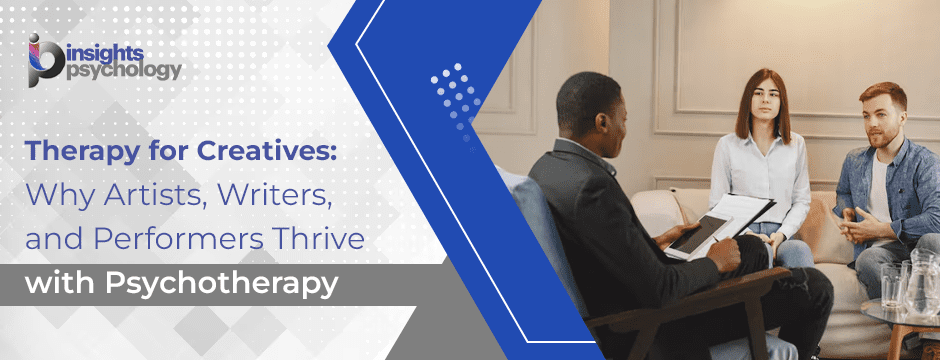Introduction: The Hidden Struggles of Creative Minds
Creativity can be both a gift and a burden. While artists, writers, and performers bring light and emotion into the world through their work, their minds are often in a state of constant motion—questioning, overthinking, and feeling deeply. The very qualities that fuel great art can also lead to anxiety, depression, burnout, or even identity crises.
At Insights Psychology, we understand that creative individuals need more than just support—they need tailored tools to navigate their emotional landscape. That’s where individual psychotherapy comes in. It’s not just about “fixing problems”—it’s about helping creatives understand themselves, reclaim emotional balance, and flourish in both life and work.
Why Creatives Are Wired Differently (And Why That Matters)
Let’s be honest—creatives process the world differently.
They feel emotions more intensely, notice details others miss, and often struggle with self-doubt or perfectionism. It’s not uncommon for an actor to internalize rejection, or for a writer to experience crippling imposter syndrome. These are not signs of weakness; they’re signs of depth.
Psychotherapy doesn’t take away that depth. Instead, it helps creatives channel it constructively—turning emotional turbulence into clarity, and self-criticism into self-awareness.
The Unique Benefits of Individual Therapy for Creatives
Therapy isn’t just for “when things fall apart.” For creatives, it can be a powerful investment in personal and professional growth. Here’s how:
1. Unleashing Creative Blockages
Have you ever stared at a blank page or canvas, paralyzed by fear or self-judgment? Psychotherapy can help identify and dismantle internal barriers, allowing creative expression to flow freely again.
2. Managing the Emotional Highs and Lows
From euphoria after a performance to despair after a rejection, creatives often ride emotional rollercoasters. Therapy provides grounding techniques and emotional regulation tools to bring stability without numbing sensitivity.
3. Improving Self-Worth and Identity
Many artists tie their self-worth to their output or recognition. Individual psychotherapy helps separate the self from the work—fostering a healthier, more resilient identity.
4. Setting Boundaries Without Losing Passion
Overcommitting or undervaluing your time can lead to burnout. Therapy helps creatives set boundaries that protect their mental health without dulling their drive.
Why Choose Individual Psychotherapy Over General Counseling?
While general counseling provides valuable support, individual psychotherapy dives deeper. It’s not just about managing surface-level symptoms—it’s about understanding your inner world.
At Insights Psychology, our approach to individual psychotherapy is designed for introspection, transformation, and long-term resilience. For creative individuals, this can mean breakthroughs in both emotional well-being and creative output.
Tailoring the Approach: Different Types of Individual Therapy That Work for Creatives
There’s no one-size-fits-all in therapy—especially not for someone whose mind works outside the box. Fortunately, there are several types of individual therapy that are particularly effective for artists, writers, and performers:
▸ Cognitive Behavioral Therapy (CBT)
Great for identifying unhelpful thought patterns—like “I’m not good enough” or “This will never work”—and reframing them into empowering beliefs.
▸ Psychodynamic Therapy
Explores how past experiences and unconscious thoughts influence present behaviors. Especially helpful for creatives struggling with imposter syndrome or unresolved trauma.
▸ Mindfulness-Based Therapy
Brings attention to the present moment, helping creatives manage anxiety and stay grounded during intense periods of work or performance.
▸ Humanistic Therapy
Centers around self-exploration and authenticity, ideal for creatives exploring identity, purpose, and meaning through their work.
▸ Expressive Arts Therapy
Integrates art, writing, or music into the therapy process—allowing clients to process emotions using their natural creative instincts.
Why Location Matters: Seeking Individual Therapy in Minnesota
If you’re a creative professional or aspiring artist in the Twin Cities—or anywhere across the state—you’re not alone. Minnesota boasts a thriving creative community, but even in supportive environments, mental health often takes a backseat.
At Insights Psychology, we offer individual therapy in Minnesota that caters specifically to the needs of creatives. Whether you’re an actor in Minneapolis, a poet in Duluth, or a graphic designer working remotely in Rochester, you deserve therapy that meets you where you are—emotionally, creatively, and geographically.
We offer virtual sessions for added flexibility and in-person sessions for those who thrive with face-to-face connection.
Real Talk: Is Therapy Worth It for Creatives?
Let’s be real—therapy is a commitment. It takes time, money, and emotional investment. But ask anyone who has gone through it, and you’ll hear a recurring theme: it changed my life.
Here’s what some of our creative clients have discovered:
- “I finally learned how to manage the pressure without losing myself in it.”
- “Therapy helped me stop equating rejection with failure.”
- “I’ve written more in the last three months than I did in the last three years.”
This is the power of therapy when it’s aligned with who you are and how you think.
Psychotherapy Services for Artists, Writers, and Performers
At Insights Psychology, we offer a range of psychotherapy services tailored to the creative community. Here’s what you can expect:
-
One-on-One Therapeutic Support
Personalized sessions focused on your emotional well-being and creative goals
-
Flexible Scheduling & Virtual Appointments
We know creativity doesn’t follow a 9–5 clock. Our scheduling adapts to your rhythm.
-
A Therapist Who “Gets” Creatives
You won’t have to explain what a creative block is or why opening night feels like life and death. We understand your world.
Breaking the Stigma: Therapy Isn’t a Weakness—It’s a Strength
Too many creatives suffer in silence, believing they need to “power through” their mental health struggles for the sake of the craft. But resilience doesn’t mean pretending everything is fine. It means knowing when to ask for help—and choosing to grow.
In fact, some of the most celebrated artists, musicians, and performers credit therapy as a game-changer in their personal and professional lives.
It’s not about being fixed. It’s about feeling seen, heard, and supported—so you can create from a place of clarity, not chaos.
Ready to Begin? Your Creative Breakthrough Starts with You
If you’ve been wrestling with emotional overload, creative paralysis, or just feel like something’s missing, it’s time to take the next step. Therapy isn’t a last resort—it’s a proactive choice for self-mastery and emotional freedom.
Whether you’re looking for guidance, healing, or just a safe space to be fully yourself, Insights Psychology is here for you. Our individual psychotherapy services are designed to help creatives not just survive, but thrive—in art, in life, and everywhere in between.
Final Thoughts: Your Art Deserves a Healthy You
The world needs your voice. Your creativity. Your perspective. But it also needs you—healthy, balanced, and whole.
If you’re ready to explore the benefits of individual therapy, reach out to Insights Psychology today. Whether you need ongoing support or a few sessions to recalibrate, we’re here to walk with you every step of the way.
Common Questions About Therapy for Highly Sensitive and Creative Minds
1. What is therapy for creatives and how does it help artists and performers?
Therapy for Creatives is a specialized form of counseling tailored for artists, performers, and highly sensitive individuals. It helps address emotional challenges such as anxiety, creative blocks, imposter syndrome, and burnout. A therapist for artists or actors provides a safe space to explore emotions, navigate self-doubt, and strengthen creative confidence. Whether you’re seeking art therapy near me or performance-focused counseling, this support can foster both emotional wellness and artistic growth.
2. Why do creative professionals often struggle with mental health issues?
Creative professionals are more prone to mental health issues due to intense emotional sensitivity, perfectionism, and pressure to produce original work. Constant self-expression and public critique can heighten stress, anxiety, and self-doubt. Many highly sensitive creative and mindful persons also experience mood fluctuations and isolation. That’s why working with a therapist for performing artists or a professional specializing in therapy for creatives is essential for long-term mental well-being.
3. Can therapy boost creativity and productivity in artists and writers?
Yes, therapy for creatives can significantly boost both creativity and productivity. A trained therapist for artists or writers helps uncover emotional roadblocks, reframe limiting beliefs, and manage performance anxiety. Techniques like mindfulness, CBT, or art therapy can inspire new ideas and build motivation. Creative clients often discover that regular therapy sessions enhance focus, reduce procrastination, and reignite their passion for their craft.
4. What type of therapy is best for creative minds?
The best types of therapy for creatives include:
- Art therapy: Using visual art for emotional expression.
- Psychodynamic therapy: Exploring deep-rooted creative blocks.
- CBT: Managing performance anxiety or negative self-talk.
- Mindfulness-based therapy: Grounding the highly sensitive mind.
Seeking the Art of Counseling from a licensed therapist for artists ensures the approach fits your emotional and creative needs.
5. How do creative blocks relate to emotional or psychological trauma?
Creative blocks often stem from unresolved trauma, self-doubt, or fear of judgment. Trauma can silence artistic expression by triggering anxiety or perfectionism. Therapy for highly sensitive creative and mindful persons addresses these underlying wounds and helps individuals reconnect with their creative voice. A therapist for performing artists can guide clients through past pain, helping restore emotional safety and creative freedom.
6. Are there therapists who specialize in working with creatives?
Yes, many therapists specialize in therapy for creatives, including writers, actors, musicians, and visual artists. These professionals understand the unique challenges faced in creative industries—such as self-doubt, rejection, and performance stress. Whether you’re looking for art therapy near me or a therapist for performing artists, specialized support is available to help nurture emotional well-being and artistic growth.
7. How can therapy support a healthy balance between inspiration and burnout?
Therapy for creatives helps establish boundaries, manage stress, and foster sustainable inspiration. By working with a therapist for artists or actors, clients learn how to pace their creative energy, avoid overworking, and prioritize mental health. Techniques such as mindfulness, goal setting, and emotional regulation are used to maintain a productive rhythm—ensuring creativity flows without leading to exhaustion or burnout.
Still waiting for the “right time” to start your next project? These hacks will prove the right time is now—don’t miss this productivity breakthrough.

